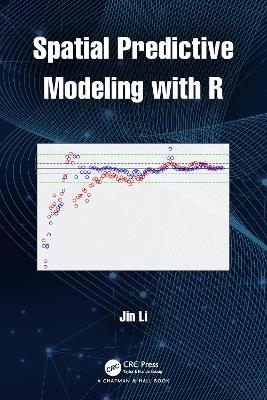
Spatial Predictive Modeling with R
Chapman & Hall/CRC (Verlag)
9780367550561 (ISBN)
Spatial predictive modeling (SPM) is an emerging discipline in applied sciences, playing a key role in the generation of spatial predictions in various disciplines. SPM refers to preparing relevant data, developing optimal predictive models based on point data, and then generating spatial predictions. This book aims to systematically introduce the entire process of SPM as a discipline. The process contains data acquisition, spatial predictive methods and variable selection, parameter optimization, accuracy assessment, and the generation and visualization of spatial predictions, where spatial predictive methods are from geostatistics, modern statistics, and machine learning.
The key features of this book are:
•Systematically introducing major components of SPM process.
•Novel hybrid methods (228 hybrids plus numerous variants) of modern statistical methods or machine learning methods with mathematical and/or univariate geostatistical methods.
•Novel predictive accuracy-based variable selection techniques for spatial predictive methods.
•Predictive accuracy-based parameter/model optimization.
•Reproducible examples for SPM of various data types in R.
This book provides guidelines, recommendations, and reproducible examples for developing optimal predictive models by considering various components and associated factors for quality-improved spatial predictions. It provides valuable tools for researchers, modelers, and university students not only in SPM field but also in other predictive modeling fields.
Dr Li has produced over 100 various publications in spatial predictive modelling, statistical computing, ecological and environmental modelling, and ecology, developed a number of hybrid methods for SPM, and published four R packages for variable selections as well as SPM.
Dr Jin Li works at Data2action, Australia as a Founder. He has research experience in spatial predictive modelling, statistical computing, ecological and environmental modelling, and ecology. As a scientist, he worked in the Chinese Academy of Sciences, University of New England, CSIRO, and Geoscience Australia. He was an Associate Editor (Jul 2008-Dec 2015) and an editorial board member (Jan 2016-April 2020) of Acta Oecologica, and a Guest Academic Editor (Mar 2018) and an Academic Editor (May 2018-Apr 2020) of PLOS ONE. He has produced over 100 various publications, developed a number of hybrid methods for spatial predictive modeling, and published four R packages for variable selections and spatial predictive modelling. For further information see https://www.researchgate.net/profile/Jin-Li-74, https://scholar.google.com/citations?user=Jeot53EAAAAJ&hl=en and https://www.linkedin.com/in/jin-li-01421a68/.
1. Data acquisition, data quality control and spatial reference systems
2. Predictive variables and exploratory analysis
3. Model evaluation and validation
4. Mathematical spatial interpolation methods
5. Univariate geostatistical methods
6. Multivariate geostatistical methods
7. Modern statistical methods
8. Tree-based machine learning methods
9. Support vector machine
10. Hybrids of modern statistical methods with mathematical and univariate geostatistical methods
11. Hybrids of machine learning methods with mathematical and univariate geostatistical methods
12. Applications and comparisons of spatial predictive methods
Appendix A. Data sets used in this book
| Erscheinungsdatum | 29.05.2024 |
|---|---|
| Zusatzinfo | 14 Tables, black and white; 53 Line drawings, color; 50 Line drawings, black and white; 53 Illustrations, color; 50 Illustrations, black and white |
| Sprache | englisch |
| Maße | 178 x 254 mm |
| Gewicht | 453 g |
| Themenwelt | Mathematik / Informatik ► Mathematik ► Computerprogramme / Computeralgebra |
| Naturwissenschaften ► Geowissenschaften ► Geografie / Kartografie | |
| Naturwissenschaften ► Geowissenschaften ► Geologie | |
| ISBN-13 | 9780367550561 / 9780367550561 |
| Zustand | Neuware |
| Informationen gemäß Produktsicherheitsverordnung (GPSR) | |
| Haben Sie eine Frage zum Produkt? |
aus dem Bereich


